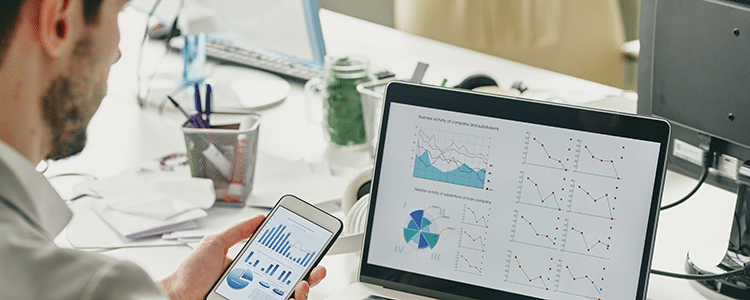ERP real time reporting allows you to access your company performance at any given time and get up-to-the-minute, accurate information. In fact, ERP systems with advanced business intelligence (BI) can provide instant updates, facilitating quicker and more informed decision-making.
Today, we’ll define what we mean by real time reporting and advise you on how to select an ERP system with these capabilities.
What is Real Time Reporting Within a Modern ERP System?
Modern ERP systems are more user-friendly and intuitive than ever before. They also have access to incredible amounts of data, thanks in large part to cloud technology and the Internet of Things (IoT).
These platforms can continually collect and process information on every aspect of your business, including your front- and back-office processes. With unobstructed access to this data, you can set and track key performance indicators (KPIs) to make business decisions that drive your bottom line.
In the past, you’d have to rely on separate BI software for this level of data analysis, or you’d have to invest a significant amount of money in software customizations. As a result, many small-to-midsized companies lacked robust data reporting capabilities simply because of the costs involved.
The good news? Real time reporting is now a standard feature in most modern ERP software. This allows you to track company data at every touchpoint, down to individual customer interactions.
Many of the vendors in our top ERP systems report provide systems with strong reporting capabilities that ensure data consistency across departments and enable real-time data insights. When scheduling ERP demos, we recommend asking vendors to demonstrate their reporting functionality in a test case, using your data.
The 2025 Top 10 ERP Systems Report
What vendors are you considering for your ERP implementation? This list is a helpful starting point.
Critical Types of ERP Data
What kind of data can you find in these real time reports? The answer is widespread and far-reaching. The reports contain a wealth of information on how your company is currently operating, with insights that include:
- Shipping capabilities
- Inventory levels
- Delivery times
- System downtime
- Machine count
- Overall equipment effectiveness (OEE)
The best part? You’re no longer required to stare at an Excel spreadsheet wondering if everyone is looking at the same timeframe and dataset.
Instead, today’s ERP solutions can present and analyze data without Excel. You’ll find interactive dashboards and charts that allow you to more clearly understand the information.
What Industries Benefit Most from Real Time Data?
There is a range of industries that require access to real time data. These are sectors in which timely updates can improve service levels, optimize operations and make processes and personnel more efficient.
A few of the industries that stand to benefit the most from the real time data provided by modern ERP systems include:
- Retail
- Manufacturing
- Agriculture
- Logistics
- Healthcare
Selecting a System: What to Look for in ERP Real Time Reporting
If you’re dissatisfied with your current ERP software, it’s likely because your organization isn’t able to access the data it needs. As such, you’ll want to pay close attention to the real time analytics capabilities within the new ERP solutions you evaluate.
How can you make sure you’re choosing the best solution for your needs? Let’s take a look at a few of the top factors to consider:
1. Easily Customizable Dashboards
As mentioned, real time ERP reporting eliminates the need for cumbersome, complicated spreadsheets that leave you more confused than you started.
We recommend looking for a system that allows you to easily customize the dashboard you see upon login. In this dashboard, you should be able to set and track department specific KPIs and clearly see where you stand.
Your system also should be visually dynamic and flexible enough to accommodate personalized views based on the parameters you choose. You shouldn’t have to click through tabs or pages of extraneous data to access the insights you need.

2. Fully Integrated ERP and CRM Functionality
When you integrate your CRM and ERP functions – or purchase a system that provides them within a single platform – you can combine the supply and demand sides of your business. Combining data and insights from these functions allows you to coordinate your customer-facing sales and marketing functions with your in-house manufacturing and distribution efforts.
As a result, you can store every detail of each customer interaction in one central database. This way, your support representatives can spend more time interacting with customers and less time talking to the shipping department about a customer’s order status.
A few of the insights that a fully integrated ERP and CRM platform can provide include:
- Customer purchase histories
- Customer order status
- Returned goods
- Inventory updates
3. Predictive and Prescriptive Analytics
Predictive analytics is a capability within certain ERP systems that projects future trends within your business. On the other hand, prescriptive analytics recommends actions that you can take today to influence positive business outcomes.
Both are required to help your company weather the inevitable ebbs and flows of business, and both require artificial intelligence (AI).
While AI is often thought of as an add-on to a standard ERP solution, savvy business owners know that it should be a core capability. We recommend looking for an ERP solution with built-in AI and machine learning.
The Power of Instant Reporting
No longer simply a nice-to-have feature, robust BI and reporting capabilities are quickly becoming must-haves in the ERP realm.
No one wants to base the future of their business on a hunch. You deserve accurate, relevant and targeted insights into every facet of your company, and ERP real time reporting can get you there.
If you’re considering a new enterprise software system, look for one that can help you make the most use of the influx of data you receive daily. Contact our ERP consultants below for more ERP selection advice.













